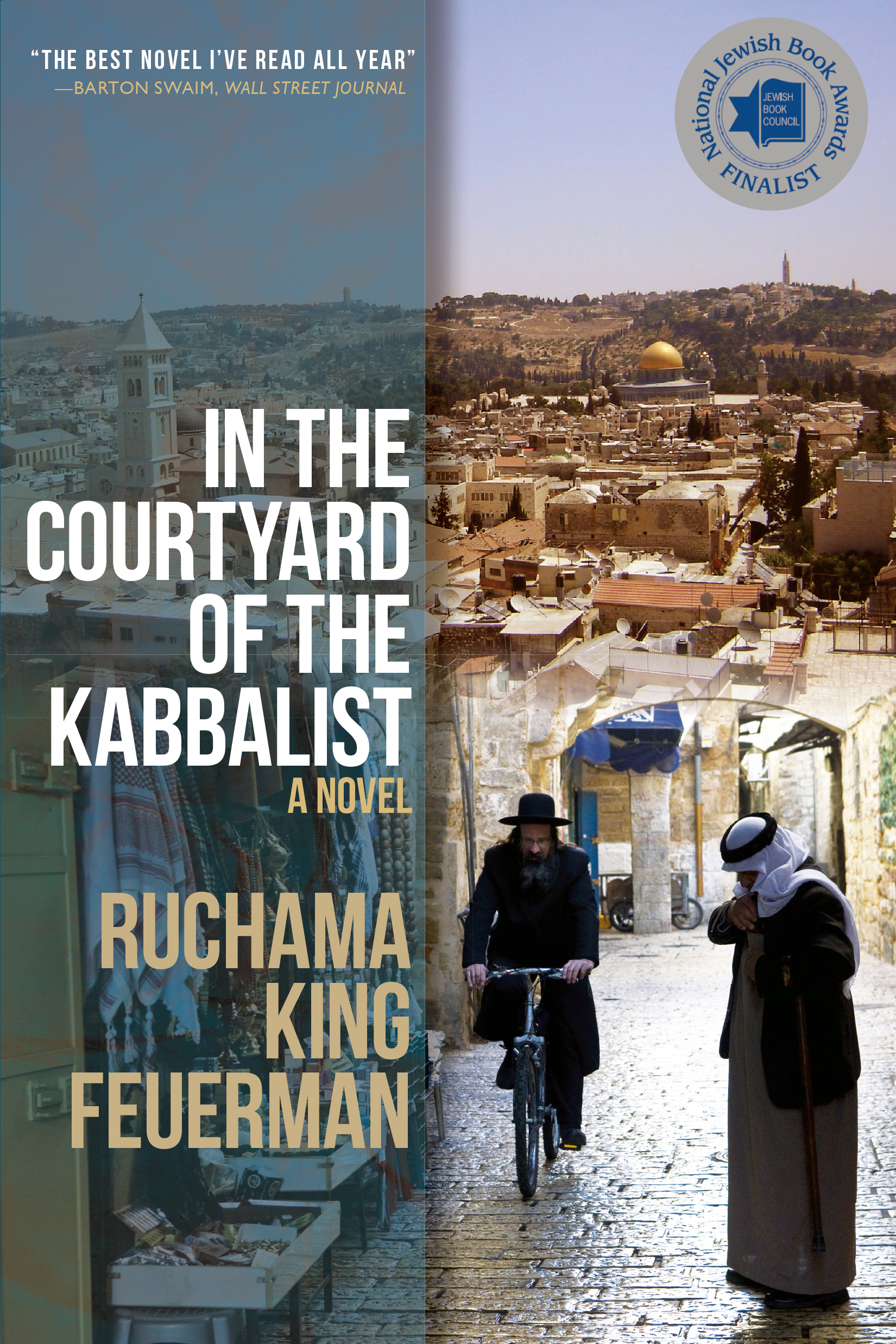
It’s said that in Jerusalem if one walks ten feet in any direction he’ll end up at an archeological site. At the Temple Mount, however, we know he doesn’t have to move an inch. The ground there is saturated with history; it’s the archeological jackpot. The mother of them all.
Now comes author Ruchama King Feuerman to mine the Mount for all its dramatic potential in her new novel In the Courtyard of the Kabbalist. In September 2013 her book hit the internet and Amazon.com with a lot of noise – so much so that last month the book went to hardcopy-paperback. And testifying to Ms. Feuerman’s mastery of her craft, The Wall Street Journal’s book reviewer describes the In the Courtyard as “engaging… brilliant…a manifestly terrific novel...”; the best novel he’s read “in ages.” Recently the book was named as a finalist for the National Jewish Book Award – highly unusual for a book with an authentic Orthodox viewpoint.
The author poses a hot question in her book: Do the ancient artifacts belong to the finders, or to those whose story it tells? The questions and their answers are politically explosive; not many story-tellers have taken them on. Yet in synchrony with current events at the Mount – including the documented destruction of Jewish relics – Ms. Feuerman does just that. She incorporates very real activity at the Mount as a springboard for an unusual story, as well as
Page2
the source of much of the book’s tension. To wit: she acquaints us with the agendas and falsehoods on both the Muslim and Jewish sides that obscure the issue of what is whose at the Mount. As well, woven into the story is the authentic cloak-and-dagger mindset of authorities, making for an engrossing tale. The story would be compelling simply if based on the recent discovery of what could be remnants of King David’s castle elicited - which elicited this response from the Israeli Antiquities Authority to the archaeologist: “Good for you....We are aware of it. Now forget about the whole thing and keep your mouth shut." The tension of Ms. Feuerman’s story has been earned. But there is so much more.
Isaac, a middle-aged, unmarried, displaced, complex American Orthodox Jew newly moved to Israel is the protagonist of In the Courtyard of the Kabbalist. Isaac encounters the friendless Mustafa, a janitor at the Mount (a.k.a. Dome of the Rock) and drops a kind word to him. With that, the seeds of an excellent plot are sown. When the deformed Mustafa finds a relic amidst debris at the Dome, he gives it in gratitude to Isaac; as far as Mustafa knows, it is simply a curiosity about to be trashed. The story takes off from that point, and an improbable, uneven - yet thoroughly believable - relationship is born. Mustafa’s consuming need for human connection, and Isaac’s tamped-down, yet similarly passionate need create a certain underlying sympatico. Concerning Mustafa, Ms. Feuerman so deftly penetrates his mind that not only does the strange association with Isaac ring true, but we find that the unfortunate janitor, unloved by even his mother, burrows his way into our kishkes. He is a character unlikely to be forgotten. All her players spill over with energy – the newly-religious Tamar looking for her soulmate, the Kabbalist and his wife, the chief of police...her characters provide the heart, and the Temple Mount the fulcrum of the book.
Page3
Other features of the plot of Ms. Feuerman’s book are propitiously timed. For instance “ownership” of the Mount is always a point of strife, always in the news. In the Courtyard reflects current experience. Much of the drama centers on the care of the Mount at the hands of Mustafa’s superiors, who operate much like the Muslim organization controlling the Mount today. In the news a few months ago was Israel’s State Controller faulting the Antiquities Authority for abandoning its duty to protect and preserve the Mount and its buried treasures. The AA has left the site entirely in the hands of the Muslim Waqf.
Aside from the compelling plot and characters, a vivid sense of place emerges: Jerusalem in its many worlds. One world is that of the Courtyard.
Isaac went searching for [the Kabbalist] in the alleys and byways, Ezekiel Street, Hosea Court, Isaiah Avenue, lost amongst the prophets until he arrived at a shabby stone-floored courtyard on Ninveh Street that fronted a two-storied cottage. He...took a seat under a stoop overhung by a thick old olive tree and waited beside an odd assortment of Jews: a mustached man in a ragged T-shirt, a woman in a polka-dotted dress sitting on a wooden chair with an open prayer book, an old lady in pink biker shorts, a burly Hassid pacing, a man weeping behind his briefcase. He noticed in the courtyard a fragrant smell of rosemary and honeysuckle and jasmine, and something else he later identified—chicken soup. ...[Isaac] got comfortable on the stoop while he waited his turn. He watched a plump, dark-skinned woman in torn stockings eat a pizza slice with olives sprinkled on top. She seemed to relish each bite, her nostrils flaring and contracting with each swallow. Suddenly, the pizza fell splat, cheese facedown, onto the courtyard stones. Isaac
Page4
stared at the woman, and the woman lifted her eyes and stared back at him. A heartbreak in her raw dark eyes. “Can I still eat it?” she rasped, reaching for the dirty slice...
A Jerusalem surging with life and lives, be they in the Courtyard, at the Western Wall, in the jail, or on the Mount, underpins the crests and troughs of individual struggle, as well as the all-too-contemporary struggle between Muslims and Jews.
It’s to be hoped that this excellently written book harbingers more well-conceived books that excite interest, satisfy a high standard of literary taste, and are appropriate for all Jews from the religious to the non-affiliated. Ruchama Feuerman’s In the Courtyard of the Kabbalist vibrates with silent cries of loneliness, human cries for affection and dignity -- and the unheard cries of Jewish antiquities rooted at the Mount.
Andrea Eller - February 2014
Andrea Eller is a freelance writer living in Jerusalem having made Aliya with her husband three years ago. Her articles have been published in print, online, and reprinted in anthologies.






